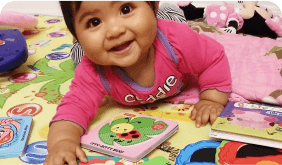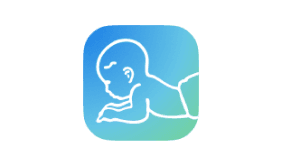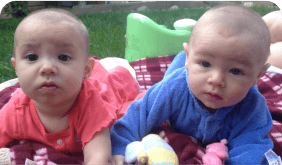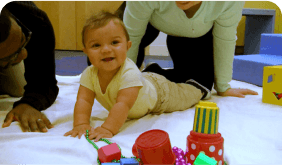You’re expecting your first baby—how exciting!
In the next few months, you’ll plan for baby’s arrival. There’s a lot to do—but don’t worry, we’ve got you covered. Here’s a list of some items first time parents should consider getting to help support and encourage baby’s development. You can also check out What Every First Time Parent Should Know, which provides all the information first-time parents need to know to care for baby in the early months.
To support baby’s motor development, check out our motor page to learn what to expect!
Additionally, consider getting these items:

A stroller: Baby will not be able to walk until they are about a year old, and even then they can only go short distances. A stroller can help you take baby on the go! This allows a first time parent to take baby to a variety of places where they can work their motor skills. If they get tired from being on the move, they can rest in their stroller as well.
Play mat or gym: This is a great way to keep baby active in the early months! They can play and do Tummy Time on the floor, which is especially good for their development.
Baby gates: Baby won’t need these until they start crawling on their own, which is around 7-9 months. But once they start moving independently, baby gates will stay up for a few years!
Simple toys to promote motor skills: Baby can really work their motor skills during play! Have some toys on hand to promote baby’s reach and grasp, as well as Tummy Time. This could include lightweight rattles that make noise when shaken, cause and effect music toys, and a floor mirror for Tummy Time. Learn more about the best toys for baby’s first year!
To support baby’s sensory development, check out our sensory page to learn what to expect!
Additionally, consider getting:

A baby bath: Bath time starts simple in the early weeks of life! Sponge baths are recommended until the umbilical cord stump falls off and the bellybutton heals, which for some babies is up to 2 weeks. After that, baby is ready to use a baby tub or the sink. Babies use these special baths for about 6 months, but that can differ depending on baby’s size and abilities. Learn more about bath time.
Hooded towels and washcloths: At the end of the bath, dry baby off as thoroughly as possible. This is not only good for their skin health, but makes them easier to handle! Drying can also be a calming sensory experience for baby. Hooded towels and washcloths can help with this.
A rocking chair: A rocking chair can provide a calming sensory experience for baby, especially as they try to sleep in the early months. Rocking is also an important part of Massage+ 30, 10, 5, a quick and powerful intervention to help baby’s development.
Swaddles: Baby may just want a swaddling blanket, or they may prefer a swaddling alternative. Remember to stop using a swaddle once baby can roll over on their own. This can happen as early as 2 months old!
Onesies and socks: Keep baby warm (and looking adorable!) with onesies and socks.
Diapers and wipes: This is an essential for baby’s care and hygiene. If baby isn’t loving diaper changes, here are some tips to make them more fun.
To support baby’s communication development, check out our communication page to learn what to expect!
Additionally, consider getting:
Baby books: Baby won’t be able to read for a while, but they still benefit from hearing you read! This is how they learn to communicate. Board books or soft cloth books are great for an additional sensory experience. High-contrast black and white books can help to engage baby’s vision.
Toys that make sounds: These can be a great way for children to learn how to associate sounds with different objects or animals, and to mimic those sounds themselves.
To support baby’s feeding development, check out our feeding page to learn what to expect!
Additionally, consider getting:

Bottles: Baby can only have breastmilk or formula for the first 6 months. A first time parent should consider a bottle rack, different nipple flows, and other accessories to make feeding easier.
Bibs: You may know that baby needs a bib once they start eating solids (around 6 months), but they may also want a bib for teething. Teething can cause drooling, so a bib can help to catch their saliva.
A high chair: Baby will not use this until they can sit up on their own, which is around 6 months old. Consider a portable chair if baby will be eating in different places!





